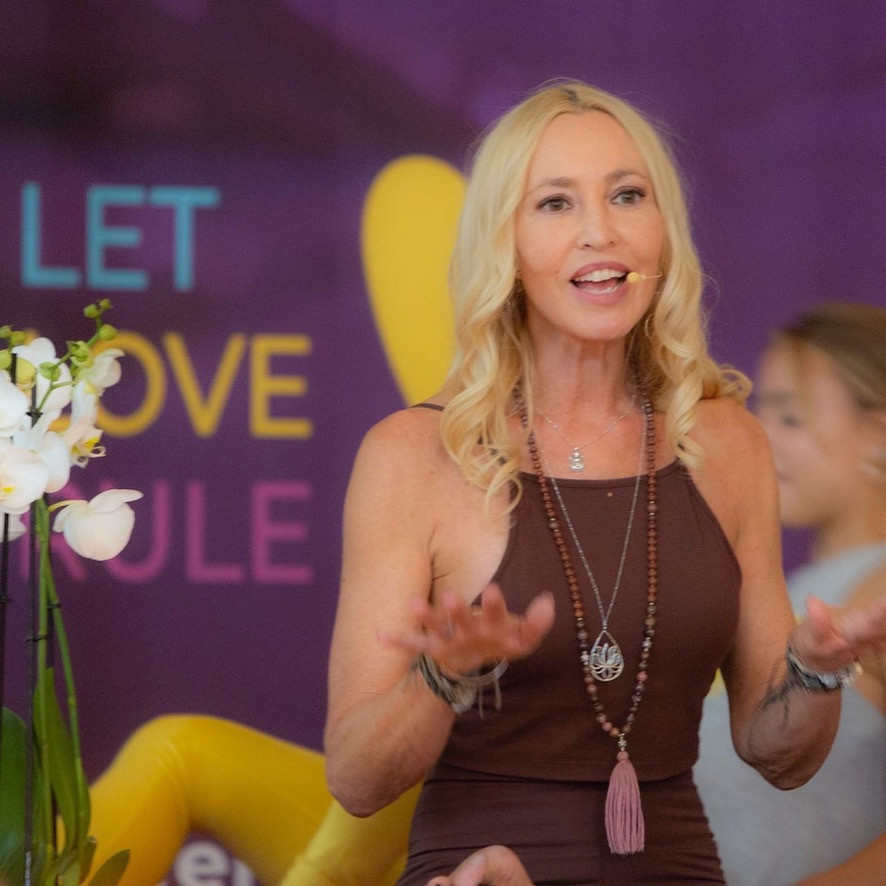For over 20 years now, Isabelle Thill, founder, director and teacher at Exhale Yoga Luxembourg, has made yoga an integral part of her daily life. It’s a discipline that she has trained in and practised in the four corners of the world: in France and Luxembourg, but also in India, China and South Africa... Her encounters here and there have strengthened her in her practice, which she continues to develop over time.
“In my opinion, yoga is the most powerful tool for physical and mental healing. It’s a tool that no one can take away from you. I’ve travelled a lot and met several yoga masters, like in India. I’ve been very lucky. The more you learn, the more you realise that there are many stages to go through to achieve true detachment. If you’re a slave to your needs, you’re weak, and by practising yoga, you learn to detach yourself and create the freedom and space to grow and evolve. Which, in my opinion, is the definition of happiness. For example, in my studio, we have this mantra that says ‘be yourself.’ If you are yourself, you attract the things that are good for you. But today, few people really dare to be themselves,” says Thill. However, yoga has become very popular, and promises its practitioners “a better, more serene life. A better state of mind. It’s a method that's accessible to everyone,” she adds.
Several levels of practice
In yoga, there are different levels of practice. “Some people practise purely for their physical well-being, others go further to work on their mind, with meditations.” Each of these practices and forms has its own characteristics and objectives. Ashtanga, for example, is a dynamic form of yoga in which every movement is synchronised with the breath. Hatha, which is gentler and more accessible, is often used to initiate new students. Kundalini is a more spiritual practice, while yin yoga targets connective tissue rather than muscles. Jivamukti has a strong philosophical dimension, with music, chanting and mediation in addition to the asanas.
All these practices, each with their own subtleties, will be highlighted at the Yoga Conference, which Thill has designed as an event to encourage cohesion and inspiration. “I’m inviting teachers I’ve met on my travels, but also lesser-known teachers and young people, who will be given the chance to make themselves known,” she explains. For two days, with around ten teachers, it will be possible to explore just as many practices, “which would require weeks of travelling all over the world! It’s only two days, but the experience is so intense.”
The event is aimed at both yoga teachers and the general public, experienced practitioners and beginners alike, with sessions at different levels. “There will also be readings and Ayurvedic food. The idea is really to convey the whole spectrum of a holistic lifestyle. To begin a journey, you have to take the first step. It’s the same for yoga. You shouldn’t put up any barriers, because getting out of your comfort zone is already a form of freedom. I don’t know anyone who regrets taking a yoga class,” says Thill.
The event opens on Friday 4 October with a jivamukti class by Thill. The following day, Saturday 5 October, will be an opportunity to practise certain forms of yoga, such as navakarana vinyasa and yin yoga. An inversion and balanced ascent workshop will be offered in the morning. In the afternoon, Rebecca Hannah will be offering an introduction to Thai flow therapy, and the day will end with a talk on ayurveda, a traditional form of medicine originating in India. Sunday’s programme includes another session of navakarana vinyasa, a workshop on ‘the art of flexibility,’ another on ‘graceful lunges and hip openings,’ a self-hypnosis workshop and a sound bath. There will also be limited places available for a workshop on the Wim Hof method, reiki treatments and two workshops for children.
While social networks have helped to democratise the practice of yoga, they have also distorted it in some ways, says Thill. “In the old days, when you went to a yoga studio, you felt safe, you went there to heal yourself, to soothe yourself. But more and more, you’ve got a mobile phone in your face, you’re being photographed, and it becomes a space where you feel even more pressure from the image. It takes away that feeling of freedom.”
However, social networks are also a tool that you need to know how to use to make yourself known, just like in any other business. Other ‘adepts’ go further and offer or practise ‘digital yoga.’ It’s a dematerialised format, but it does take some of the spirit out of yoga. “An online class cannot replace a face-to-face class. It can even be dangerous in some cases, if there’s no one there to guide you. It’s a solution when you don’t have a choice, like in the days of confinement.”
“Today, yoga is everywhere. Which is good, but it’s become a bit of a business that’s also lost its spiritual side--it’s an inner workout, not an outer one,” says Thill. The discipline has, for example, found its way into the corporate world “to get away from the routine of competition, make better decisions and reduce stress at work.”
“When I started, there was very little yoga in Luxembourg. Classes were held in sports halls, and they were much less inspiring, because they lacked the atmosphere that is specific to yoga,” recalls Thill.
There are also an increasing number of yoga ‘teachers,’ who are not always properly trained. “But many people don’t do it full-time, which I can understand for financial reasons. If you have a job in a bank and you teach yoga in the evening, I don’t think it's the same quality or the same attitude. If you only look at the teachers who have real training and who are constantly learning, who are in a whole state of mind, there are far fewer of them, I’d say maybe 20. Yoga is like a path that never ends, and that’s its beauty. You’re constantly renewing your teaching style,” she says.
A slight downturn, according to Thill
So should there be more supervision of training? “In Luxembourg, it’s not very regulated. Yoga Alliance is an organisation that certifies training, but it’s not compulsory. In Luxembourg, a business permit is enough to open a yoga studio. It might help, in Luxembourg as in Europe, if things were regulated. But in India, for example, these questions don’t arise. We work more on instinct.”
To stand out from the crowd, Thill, like other enthusiasts, has adopted a progressive approach that involves constant training. “Starting this month, I’ll be giving classes in a method called navakarana. It’s a very strict and pure practice that requires discipline. Other styles of yoga are more diluted and sometimes resemble dance,” explains the specialist, who nevertheless believes that yoga is experiencing a slight “downturn, because the peak has passed and other disciplines have become fashionable, such as Pilates.”
This article was originally published in .






















